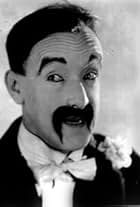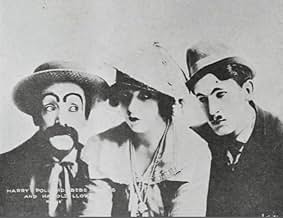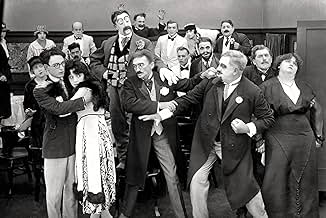'Snub' Pollard(1889-1962)
- Actor
- Soundtrack
In recalling silent movie comedian Harry "Snub" Pollard, his slight frame (5' 6"), bullet-shaped head and dark, droopy mustache are definitive identification badges. Born in Melbourne, Australia as Harold Fraser on November 9, 1889, he started off performing with the Pollard's Lilliputian Opera Company at an early age and was also a church choirboy. Adopting the last name of "Pollard" as his last name moniker in tribute to the company, he went on to perform with other Down Under children's troupes. When a vaudeville company he was touring with in 1910 made it to the United States, Harry decided to stay in the country.
Nicknamed (and billed) "Snub," he started off in bit parts at the Essenay Film Studios in 1911 and briefly worked with the Keystone Kops. Moving up into support roles, often with the Keystone Cops series, Hal Roach took an avid interest in him and, by 1915, had Snub co-starring with Harold Lloyd and Bebe Daniels in the highly successful Lonesome Luke series, which ran for years (86 films in all). In 1919, Snub took a chance and ventured on with his own solo one- and two-reeler's with zany slapstick, sights gags and gimmicks-a-plenty. He performed many of his own stunts and was often seriously injured as a result. Many of them were ably directed by Charley Chase and co-starred Marie Mosquini as his frequent leading lady. Snub's "second banana" status, however, was firmly entrenched, and his starring vehicles were met with only a modicum of interest. One of his most notable is the short comedy It's a Gift (1923) in which he played an eccentric inventor pursued by oil magnates interested in his newest creation.
In between Snub made personal appearances on the farcical stage. His production film company, created in 1926, was forced to fold and found himself relegated to supporting other top comedians again, notably Stan Laurel and Oliver Hardy and Andy Clyde. He was further financially strapped when the Depression hit. By the late 1930s, he was appearing in "poverty row" films. One last hurrah would be his playing of Pee Wee, the sidekick to cowboy Tex Ritter, in a series of minor westerns. Relegated now to atmospheric bits, it is noted that in the film Singin' in the Rain (1952), he is the rained-on passerby that Gene Kelly gives his umbrella to toward the end of the title song. Snub continued to work in relative obscurity until his death on January 19, 1962 of cancer. Earning a star on the Hollywood Walk of Fame for his work in silent films, the thrice-married actor was interred at Forest Lawn Memorial Park in the Hollywood Hills.
Nicknamed (and billed) "Snub," he started off in bit parts at the Essenay Film Studios in 1911 and briefly worked with the Keystone Kops. Moving up into support roles, often with the Keystone Cops series, Hal Roach took an avid interest in him and, by 1915, had Snub co-starring with Harold Lloyd and Bebe Daniels in the highly successful Lonesome Luke series, which ran for years (86 films in all). In 1919, Snub took a chance and ventured on with his own solo one- and two-reeler's with zany slapstick, sights gags and gimmicks-a-plenty. He performed many of his own stunts and was often seriously injured as a result. Many of them were ably directed by Charley Chase and co-starred Marie Mosquini as his frequent leading lady. Snub's "second banana" status, however, was firmly entrenched, and his starring vehicles were met with only a modicum of interest. One of his most notable is the short comedy It's a Gift (1923) in which he played an eccentric inventor pursued by oil magnates interested in his newest creation.
In between Snub made personal appearances on the farcical stage. His production film company, created in 1926, was forced to fold and found himself relegated to supporting other top comedians again, notably Stan Laurel and Oliver Hardy and Andy Clyde. He was further financially strapped when the Depression hit. By the late 1930s, he was appearing in "poverty row" films. One last hurrah would be his playing of Pee Wee, the sidekick to cowboy Tex Ritter, in a series of minor westerns. Relegated now to atmospheric bits, it is noted that in the film Singin' in the Rain (1952), he is the rained-on passerby that Gene Kelly gives his umbrella to toward the end of the title song. Snub continued to work in relative obscurity until his death on January 19, 1962 of cancer. Earning a star on the Hollywood Walk of Fame for his work in silent films, the thrice-married actor was interred at Forest Lawn Memorial Park in the Hollywood Hills.



























